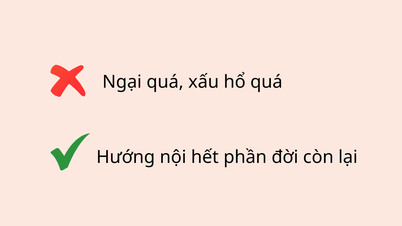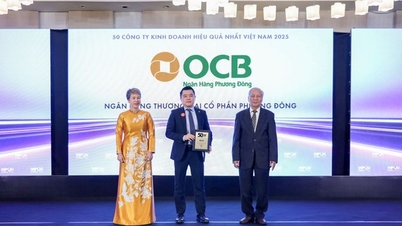Do you often refuse to take on extra work at work, have little interest in management positions, and prioritize your “after 5pm” life over your “9 to 5” job? If so, you may be a career minimalist.
This isn’t a judgment, but a term that’s becoming increasingly popular, especially when it comes to Gen Z. And behind it lies a tectonic shift in how young people view the value of work, money, and their own lives.
"Career Minimalism" - a rebellion against the "workaholic" culture
Minimalism is a philosophy of living by focusing on the essentials, eliminating excess to prioritize what truly brings value – like relationships, passions or mental health – instead of chasing after material things. Now, Gen Z is applying this principle to the place where they spend 8 hours a day: the office.
“Career minimalism” does not mean working less or being lazy, but it is a conscious choice. Instead of chasing flashy titles or taking on more responsibilities without commensurate pay, many young people are proactively “cleaning up” their careers, keeping their main jobs at a level sufficient to ensure financial security, and devoting all their energy and enthusiasm to their passions outside of work.
“This is a conscious shift away from relying on a single employer, establishing clear boundaries, expanding the concept of career satisfaction, and building multiple streams of income for financial stability,” said Chris Martin, head of research at Glassdoor. Gen Z is not rejecting work, he said, but rejecting the old model that has been imposed on them.
The rise of this trend is a natural reaction after years of previous generations, especially millennials, being drained by the workplace’s hustle culture and empty slogans about “follow your passion.” Gen Z has seen promises of stability, pensions, and prestige in exchange for long-term loyalty broken or rendered meaningless amid mass layoffs, economic uncertainty, and the rise of AI. They no longer believe in the beaten path.
Avoid "fame but no substance" titles
One of the most obvious manifestations of career minimalism is Gen Z’s skepticism of the traditional career ladder. The numbers from a Glassdoor survey are shocking: 68% of Gen Z workers said they would not pursue a management role without a pay raise or a title that actually carries weight.
For them, a “manager” title without adequate compensation is a “poisoned chalice”—more responsibility, more pressure, but no corresponding increase in financial gain or personal value. They are rationally pragmatic. Derek Thomas, head of recruiting at KPMG, describes their attitude as “show me.” They’ll ask, “You say it’s good for me, but is it really?”
Instead of climbing a rigid ladder, Gen Z opts for the “lily pad” model. “It’s a journey that allows us to jump to whatever opportunity is best suited for us at the moment,” explains Morgan Sanner, career expert at Glassdoor. “In the long run, that kind of flexibility is sustainable, realistic, and more relevant to today’s workplace.”
A leap might be taking a pay cut to gain more free time, accepting a lower title to do more creative work, or moving to a more stable industry in the face of AI threats.

Gen Z is pursuing career minimalism – a deliberate mindset shift, a carefully calculated financial strategy to face a volatile world . (Photo: Getty).
However, it would be wrong to assume that Gen Z is completely avoiding leadership roles. Other data from Glassdoor itself shows that this generation is entering management at the same rate as previous generations, now accounting for about 10% of all managers. Daniel Zhao, chief economist at Glassdoor, clarifies this contradiction: "Management is still seen as the primary path to career advancement."
The problem is not that they refuse, but that they only accept when the economic and benefit problem is resolved fairly.
Once in the leadership chair, they are rewriting the rules of the game. Gen Z manages with empathy, values open communication, provides constant feedback, and sees supporting the mental health of employees as part of their fundamental responsibility.
The "side hustle" generation - where true ambition and second cash flow shine
So if not all the energy is devoted to climbing the career ladder, where do Gen Z’s ambitions lie? The answer lies in side hustles.
This is the fertile ground where their ambition, creativity, and entrepreneurial spirit can fly freely. Data from Harris Poll shows an impressive number: 57% of Gen Z has at least one side job, far surpassing millennials (48%), Gen X (31%), and baby boomers (21%). This confirms that they are the true "side hustle generation".
Financially, this is a smart diversification strategy. In a volatile job market, relying on a single source of income is a dangerous gamble. By building secondary cash flows, Gen Z is creating their own financial safety net, minimizing risk and increasing independence.
But side hustles are about more than money. They are a space for them to be their own boss, to pursue their passions (42% do them for passion), and to build their own professional identity, separate from their 9-to-5 jobs. The main job becomes a “sponsor” for their “passion projects.” As one teacher in Iowa put it, “I often joke that I don’t dream about work. Passion is for the 5 p.m. to 9 p.m., after the 9-to-5.”
Popular side hustles range from highly specialized jobs like nurse practitioner ($56/hour), psychotherapist ($30/hour), and accountant ($23/hour) to creative jobs like copywriting ($22/hour) and graphic design ($20/hour).
The future of work or a wake-up call for businesses?
Gen Z's "career minimalism" philosophy is not a passing trend, but a preview of the future of work. It poses a huge challenge and opportunity for businesses.
No longer just a benefit, work-life balance is a non-negotiable requirement. 32% of Gen Z ranked it as the top factor when choosing a job, even more important than a high salary. Companies that insist on maintaining rigid work policies will face the risk of brain drain, with 72% of Gen Z having considered leaving a job for this reason.
Leading companies are listening. Goldman Sachs ditched its rigid dress code. General Motors replaced its 10-page policy with a simple “dress appropriately” statement. Google and Microsoft invested heavily in mental health support programs and flexible leave. Canva even encourages employees to give back to their communities during work hours, resulting in a 92% employee satisfaction rate.

Diversifying income with a side job, Gen Z pursues their passion while building a financial "shield" against fluctuations and AI (Photo: Freepik).
The formula for Gen Z is clear: a stable job to ensure financial security, one (or more) side jobs to nurture passion and generate extra income, and clear boundaries to protect mental health and maintain long-term sustainability.
The future of work is no longer about those who are constantly climbing an endless ladder, but about those who are flexible enough to jump from one “lotus leaf” to another, confidently choosing opportunities that align with their goals and values. Businesses that fail to adapt to this silent revolution will soon be left behind.
Source: https://dantri.com.vn/kinh-doanh/gen-z-toi-gian-su-nghiep-va-cu-hich-tai-dinh-hinh-thi-truong-lao-dong-20250925142749084.htm


![[Photo] High-ranking delegation of the Russian State Duma visits President Ho Chi Minh's Mausoleum](https://vphoto.vietnam.vn/thumb/1200x675/vietnam/resource/IMAGE/2025/9/28/c6dfd505d79b460a93752e48882e8f7e)


![[Photo] The 4th meeting of the Inter-Parliamentary Cooperation Committee between the National Assembly of Vietnam and the State Duma of Russia](https://vphoto.vietnam.vn/thumb/1200x675/vietnam/resource/IMAGE/2025/9/28/9f9e84a38675449aa9c08b391e153183)
![[Photo] Joy on the new Phong Chau bridge](https://vphoto.vietnam.vn/thumb/1200x675/vietnam/resource/IMAGE/2025/9/28/b00322b29c8043fbb8b6844fdd6c78ea)


























































































Comment (0)